|
|
|
Sort Order |
|
|
|
Items / Page
|
|
|
|
|
|
|
| Srl | Item |
| 1 |
ID:
120748


|
|
|
|
|
| Publication |
2013.
|
| Summary/Abstract |
The relative impacts of social influence and political party affiliation on electoral choices depend on the maturity of the political party system. In established democracies political party affiliation has a decisive impact on electoral choices whereas in democratizing countries political discussion influences over-time volatility in electoral outcomes. This paper investigates the significance of both factors on individual attitudes toward political candidates in Turkey. Findings from an experiment where social disagreement and candidate political party affiliation are manipulated indicate that young voters are sensitive to both partisan cues and socially supplied disagreement in forming and changing their attitudes toward political candidates. The results also show that, unlike most developing countries with weak parties, party label in Turkey is an important heuristic for making electoral choices. However, social disagreement can make political attitudes unstable. The findings suggest that Turkey presents us with a case in between the developed country voters' iron clad partisan attachment and the developing country voters' high susceptibility to socially communicated persuasive messages.
|
|
|
|
|
|
|
|
|
|
|
|
|
|
|
|
| 2 |
ID:
093897
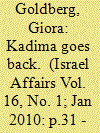

|
|
|
|
|
| Publication |
2010.
|
| Summary/Abstract |
Kadima lost the 2009 elections to the Likud after it had come to power in the 2006 elections. While Kadima only lost one seat (28 instead of 29), and even remained the largest party in the Knesset, it had no chance of remaining in power. Kadima is the most important phenomenon in the Israeli party system in recent years. Despite the fact that it did not win the 2009 elections its influence on the political system has been enormous. After its victory in 2006 Labour and Likud tried to copy it, as happens with every successful product. The best way to relate to Kadima is as a completely different phenomenon, in terms of the standard tools of the historical party map and the traditional division into blocs. This approach denies the former five conceptions of Kadima: a classic centre party, a neo-centrist party, a centrist party in the left bloc, a faction in the Likud or a middle party.
|
|
|
|
|
|
|
|
|
|
|
|
|
|
|
|
| 3 |
ID:
170371
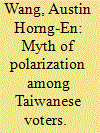

|
|
|
|
|
| Summary/Abstract |
Are Taiwanese voters polarized? By presenting four novel visualizations based on a factor analysis of Taiwan National Security Surveys from 2002 to 2017, this article describes the contours of structural change in Taiwan politics. Overall, the cross-strait position among Taiwanese voters can be described by a stable inverted U shape over time. This arises from the fact that most nonpartisans—typically neglected in the literature on polarization—are moderate. Before 2008, increasing polarization among partisans can be attributed to pan-green voters moving toward independence. Between 2008 and 2014, decreasing polarization stems from moderates self-identifying as pan-blue supporters. Since 2014, a record-breaking number of nonpartisans have left the pan-blue camp, and more extreme pan-blue voters have contributed to a return of polarization among partisans. The results yield important implications for the study of polarization and populism, as well as for the future of Taiwanese politics.
|
|
|
|
|
|
|
|
|
|
|
|
|
|
|
|
| 4 |
ID:
078407


|
|
|
|
|
| Publication |
2007.
|
| Summary/Abstract |
This article compares partisanship across East Asian nations, with four indicators reflecting different dimensions of the concept. Across these indicators, partisanship in East Asian nations was found to be relatively weak compared to most Western democracies, reflecting the less institutionalized nature of their party systems. This could be caused by insufficient time to develop partisanship through mechanisms such as electoral experience and parental socialization. Further breakdowns of income, gender, age groups, and educational levels of partisans showed that more advanced democracies share a relatively uniform pattern across demographics, while young democracies in East Asia showed a more skewed distribution of partisan identifiers, unevenly distributed across income and gender groups. This pattern suggests partisanship is likely to start its development from certain segments of the population and then spread into other segments of the society as a party system becomes more institutionalized
|
|
|
|
|
|
|
|
|
|
|
|
|
|
|
|
| 5 |
ID:
173196
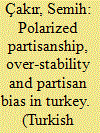

|
|
|
|
|
| Summary/Abstract |
A vast literature demonstrates that partisanship has a stabilizing impact on politics, as it limits electoral volatility. Recent studies have also shown that polarization increases partisanship, thus contributing to electoral stability. Focusing on Turkey, an unconsolidated and highly polarized democracy, this study investigates the role of partisanship in a comparative context by means of data from the Comparative Study of Electoral Systems project. I find that Turkey (among more than 40 countries) is a very high-partisanship country, where partisanship greatly shapes the evaluations of short-term determinants of vote and the vote itself. This research also shows that partisanship in Turkey is associated with very low electoral volatility and defection rates. Moreover, the degree of identification also plays a significant role in its impact on volatility and defection. These findings from the Turkish case offer insights and stimulate a new normative debate on the role of partisanship in unconsolidated democracies.
|
|
|
|
|
|
|
|
|
|
|
|
|
|
|
|
| 6 |
ID:
105704


|
|
|
|
|
| Publication |
2011.
|
| Summary/Abstract |
Since the late 1980s, Northern Ireland has seen a radical electoral shift away from the historically dominant parties in the Catholic and Protestant blocs - the Social Democratic and Labour Party (SDLP) and Ulster Unionist Party (UUP), respectively - towards the traditionally more 'extreme' parties - Sinn Fein and the Democratic Unionist Party (DUP). This change in aggregate support has been accompanied by increasing differences between generations as older cohorts of UUP and SDLP supporters have been replaced by newer cohorts of DUP and Sinn Fein partisans. This is not a result of increased polarisation in values and attitudes (whether overtly political or simply communal intolerance) among younger cohorts who are, if anything, slightly more moderate than their forbears. Rather, this results from the changing political context in which new generations have been socialised - in particular the expanded choice sets facing voters as they have reached voting age. This in turn has positive implications for the consolidation of devolved democratic governance.
|
|
|
|
|
|
|
|
|
|
|
|
|
|
|
|
| 7 |
ID:
161598
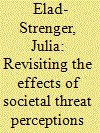

|
|
|
|
|
| Summary/Abstract |
Past research has produced convincing evidence for the association between perceived societal threat and political conservatism. Based on the view of political worldviews and threat perceptions as multifaceted constructs, the present study suggests that certain types of perceived threat are actually associated with the endorsement of more politically liberal positions. Employing a three-wave naturalistic design, we examined the unique longitudinal effects of perceived threats from real-life political events that challenge either liberal or conservative values, on conflict-related attitudes, using a nationally representative sample of Jewish-Israelis (N = 437). Consistent with our hypotheses, perceived threat from events that challenge conservative values was associated with increased militaristic attitudes and decreased willingness to compromise for peace over time, whereas perceived threat from events that challenge liberal values was related to decreased militaristic attitudes and increased willingness to compromise for peace over time. Theoretical and practical implications of these longitudinal effects are discussed.
|
|
|
|
|
|
|
|
|
|
|
|
|
|
|
|
| 8 |
ID:
118515
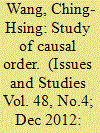

|
|
|
| 9 |
ID:
116636


|
|
|
|
|
| Publication |
2012.
|
| Summary/Abstract |
It remains unknown if theoretical perspectives concerning party identification can be usefully applied to the formation or consolidation of state identification. Taiwan presents a unique case for exploring the nature of state identification, not only because of the ambiguity concerning its official name, but because its citizens have been struggling with a hard choice between Chinese identification, an identification based on cultural heritage that is considered to be the root of its legitimacy, and an emerging national identification with an independent Taiwan which is beginning to consolidate. Theoretical work is needed to explain the nature and the volatility of state identification in the light of conventional wisdom about party identification. This study concentrates on clarifying the relationships between party identification, national/ethnic identification, and state identification. It will show how these concepts are interwoven and how the idea of a "state identification crisis" originated. It will also shed light on studies about conflict process and political psychology.
|
|
|
|
|
|
|
|
|
|
|
|
|
|
|
|
|
|
|
|
|